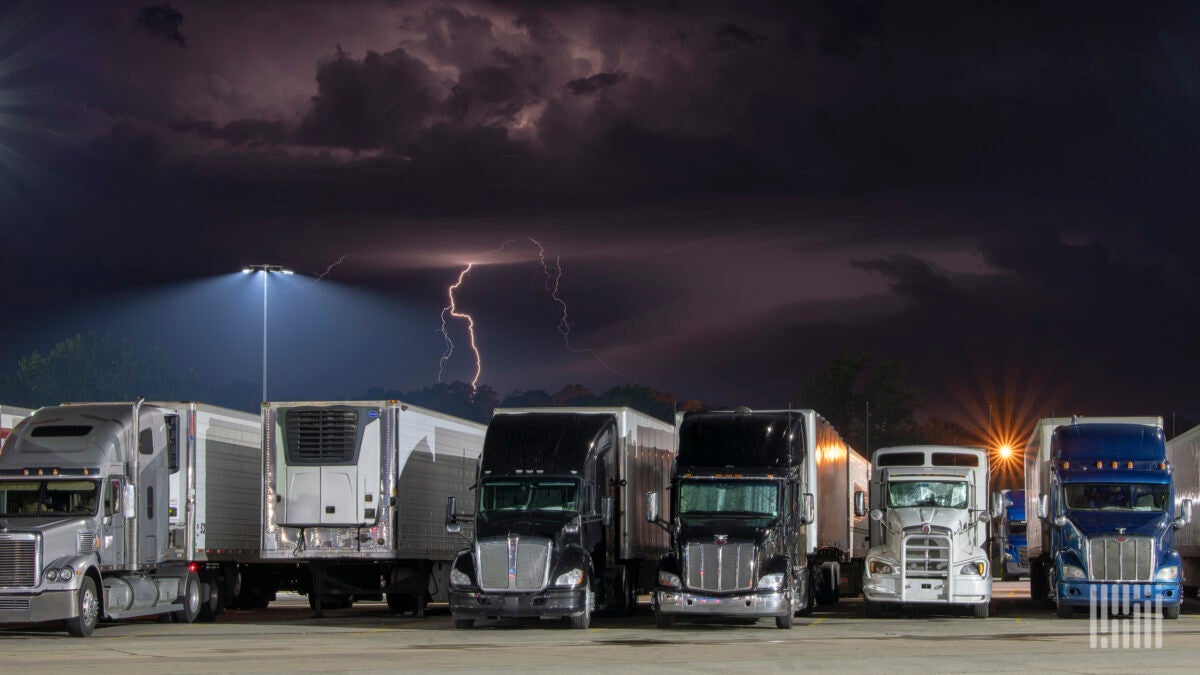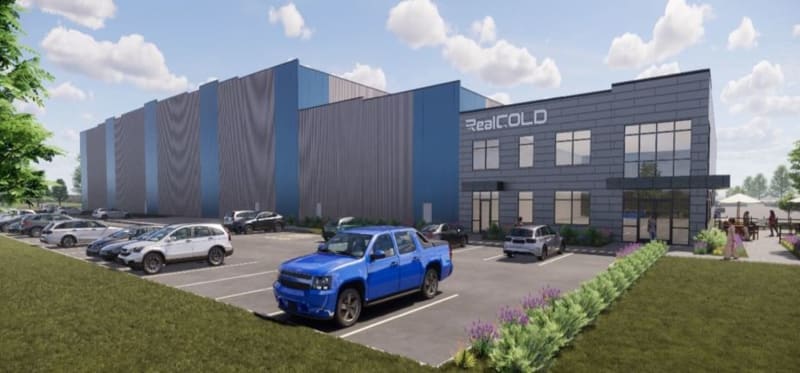Borderlands is a weekly rundown of developments in the world of United States-Mexico cross-border trucking and trade. This week: Cargo theft trends are changing as supply chains shift to border regions; a $65 million cold storage facility could be headed to Central Texas; Gebrüder Weiss opens a logistics operation in Laredo; and a truck driver is stopped at the border with $12 million in cocaine.
Cargo theft trends changing as supply chains shift to border regions
Crimes against truckers in the United States, Mexico and Canada are on the rise, costing trucking and logistics industries up to $1 billion annually.
Traditionally, cargo theft in the U.S. has been concentrated in places such as ports and facilities in California, Texas and Florida. In Canada, the majority of thefts usually occur in the Toronto region, while in Mexico trucks and logistics centers in the country’s central states are often targeted.
With more manufacturers leaving Asia and moving facilities to Mexico, Canada or other locations near or along border regions to capitalize on shifting supply chains, trade experts say it could affect cargo thieves’ patterns and methods.
“The criminal element within our industry and really any industry, they know when to exercise against people’s vulnerabilities when it comes to the supply chains, specifically for the United States,” Karl Fillouer, vice president of sales at Circle Logistics, told FreightWaves. “Any increase or decrease in capacity, any increase or decrease in the associated volume of freight moving, and any change in where that freight moves, the lanes it’s moving in, creates opportunity for thieves.”
Fort Wayne, Indiana-based Circle Logistics is an asset-based full-service logistics company founded in 2011. The company has nine locations across the U.S., including a facility in Laredo, Texas.
Fillouer said the freight industry in the U.S. has seen a large uptick in incidences of fraud and cargo thefts over the last year, with criminals using fake web domains and spoofing software to throw off tracking devices.
“We are seeing a very sophisticated approach to fraudulent activity that’s probably being managed overseas or in some country other than the U.S.,” Fillouer said. “This includes not only spoofing and tracking software, but also setting up fake domains for small and large carriers.”
Truckload carriers across the U.S. saw a sharp rise in cargo thefts during the second quarter — with thieves targeting everything from electronic goods to food and beverage products and construction materials.
Verisk Analytics’ firm CargoNet, which tracks voluntarily reported cargo thefts, said there were 566 incidents in the U.S. and 16 in Canada in the second quarter, a 57% year-over-year increase compared to 2022.
Cargo thefts were most common in California, Texas, Florida and Illinois, CargoNet said.
The most targeted loads included electronics, home and garden goods, as well as food and beverage supplies, building and industrial materials and auto parts.
In Mexico, 1,280 cargo theft incidents were recorded from January through September, about 142 per month, according to Mexico’s National Association of Vehicle Tracking and Protection Companies (ANERPV).

Circle Logistics has been fortunate in fighting against cargo thieves with a strong anti-fraud approach while focusing on standard operating procedures, Fillouer said.
“One of the things I preach to shippers, the actual customer that’s making the shipment, they’ve got access to the carrier when the carrier is picking up the freight,” Fillouer said. “We need more shippers to insist on, when a driver shows up, the shipper checks the driver’s license, as well as the equipment that needs to be logged and verified.”
Fillouer said shippers should also make sure the truck picking up a load belongs to the carrier it was brokered too.
A recent cargo theft incident tracked and investigated by Circle Logistics involved a shipment that was supposed to leave Dallas and head to the East Coast.
“It started with a small carrier that we use regularly. Somebody spoofed their identification by creating a fake domain,” Fillouer said. “They were calling for shipments from us that were on our load board. Whether or not the person who was doing this was still involved with that carrier we use, we don’t know. But they were able to have us dispatch a load to them.”
When Circle Logistics dispatched the load to the fake carrier, they turned around and brokered the load to a top 10 U.S. brokerage/carrier, Fillouer said.
“That Top 10 broker/carrier turned around and re-brokered it to an unsuspecting carrier. It was that carrier that actually picked up the freight in Texas, and they started moving down the road,” Fillouer said. “They were able to pick up the freight by fraudulently representing themselves as Circle Logistics.”
The cargo thieves used spoofing software to move cellphone tracking, making it appear as if the load was heading to the East Coast, which was where it was supposed to go. In actuality, the load was eventually transported to a warehouse in the Los Angeles area.
“The sheriff’s department in Los Angeles County orchestrated a raid on that warehouse, arrested more than a dozen people and found it was more than half full with all stolen items,” Fillouer said. “They were able to find our bill of lading, but the product that got stolen from us was gone.”
$65M cold storage facility could be headed to Central Texas
RealCold, a national cold chain provider, plans to build a 310,000-square-foot cold storage facility in the town of Lockhart, just south of Austin, Texas.
The Lockhart cold chain facility will house over 36,000 pallets and is aimed at catering to the increasing demands from customers, RealCold officials said.
Along with the Lockhart facility, RealCold also announced plans to simultaneously build a 376,000-square-foot cold chain facility in Lakeland, Florida.
“These next-generation facilities will service 10 million and six million people within 100 miles of Lakeland and Lockhart, respectively, and become a gateway to fulfill refrigerated and frozen products across the southern U.S.,” Keith Goldsmith, CEO of RealCold, said in a news release.
RealCold plans to break ground on both of these multi-temperature facilities by the end of the year, with constructions scheduled to be completed in 2025.
RealCold was founded in 2022 and is backed by Related Fund Management, a real estate asset investment advisory firm based in New York.

Gebrüder Weiss opens logistics operation in Laredo
Transport and logistics operator Gebrüder Weiss has opened a 16,146-square-foot warehouse in Laredo.
The company will provide logistics services, as well as customs clearance and bonded storage at the facility.
“Our new team is located in Laredo directly at the intersection of two countries, both of which are major trading partners,” said Mark McCullough, country manager of Gebrüder Weiss North America. “As much as 40% of the trade between Mexico and the United States is handled via Laredo.”
Gebrüder Weiss also has logistics operations in Dallas and El Paso, Texas. The company has 10 locations across the U.S.
Austria-based Gebrüder Weiss has around 8,000 employees working at 180 company-owned locations in 35 countries.
Truck driver stopped at border with $12M in cocaine
A Mexican national is facing charges of possession with intent to distribute cocaine from Mexico into the U.S., according to court documents.
Truck driver Oswaldo Lopez-Escobar arrived at the Mariposa port of entry in Nogales driving a tractor-trailer on Oct. 4.
During a search, U.S. Customs and Border Protection officers found 155 packages of alleged cocaine concealed in the trailer. The alleged narcotics have an estimated value of around $10 million to $12 million.
Lopez-Escobar faces up to life in prison and a fine of $10 million if convicted.
Click for more FreightWaves articles by Noi Mahoney.
More articles by Noi Mahoney
Texas DPS ends truck safety inspections after $1.9B impact
Tesla’s electric vehicle factory in Mexico could be delayed
Texas resumes cargo truck inspections at Laredo port of entry







